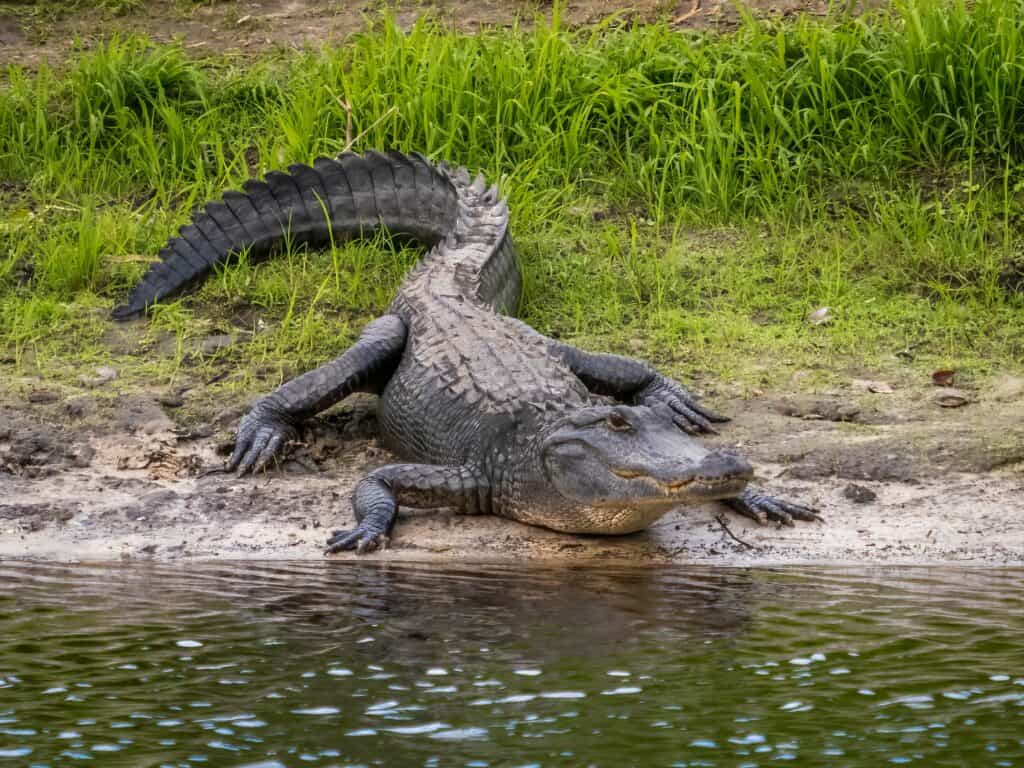
Alligators are top predators that feed on any animal within the grip of their powerful jaws.
©Jim Schwabel/Shutterstock.com
Alligators are among the most feared creatures in the world, not to mention they are the top predators in the wild.
Their ability to lurk in the waters and slither on land gives them the advantage of being terrifying reptiles both on land and beneath the waters.
As carnivorous animals with a bite force that can rip even a hippopotamus to shreds, they feed on a diverse range of animals from blue crabs, crayfish, crustaceans, worms, fish, insects, to massive mammals like muskrats, deers, and even black bears!
Given this very wide range of an alligator’s diet, you may think that one of the animals they may be restricted from eating is snakes.
It’s because some snakes are venomous, and even though snakes may be smaller in size, weight, and build compared to an alligator, there is a huge chance that the snake would win between an alligator vs. snake battle because they have a deadly weapon: their venom.
However, the video we will be showing you today depicts otherwise. Below, we will witness a cottonmouth vs. alligator battle in Florida waters and discuss who wins and why.
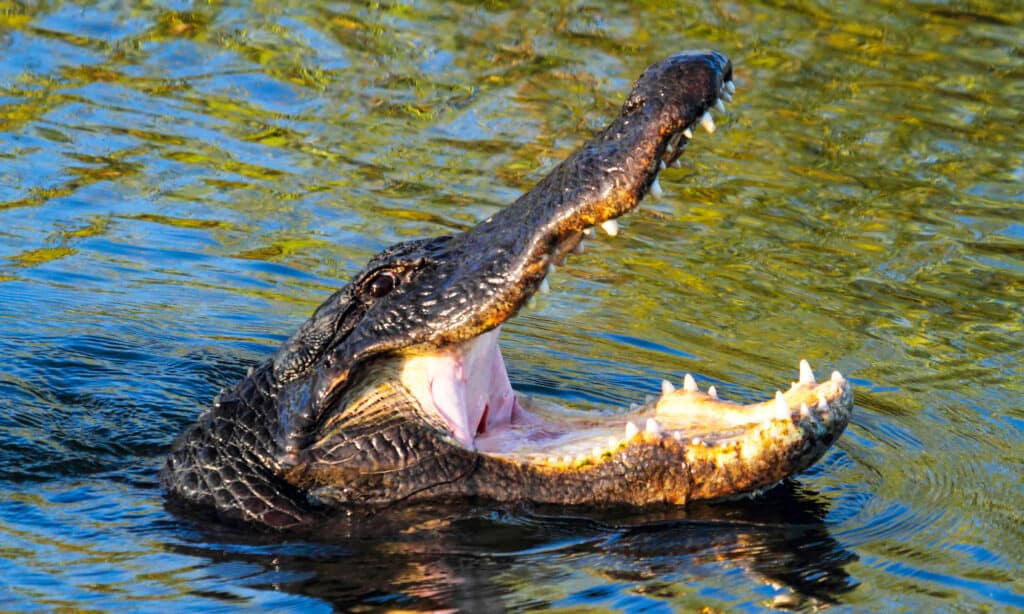
Very large alligator feels threatened.
©Steve Byland/Shutterstock.com
Do Alligators Normally Eat Snakes?
Alligators are carnivorous reptiles that feed primarily on birds, fish, turtles, frogs, and small to medium mammals. However, they are also opportunistic feeders, so they may consume and devour anything that may come their way, and yes, that includes snakes.
Although they may occasionally eat snakes, the reptiles are not normally a part of their diet – especially the venomous ones. But as semi-aquatic foragers who are prone to snake encounters, this immunity to venom is something they can rely on at times of need.
Furthermore, while alligators live in almost the same habitat range as snakes, they are not considered among their top predators.
Alligators are opportunistic feeders, which means that they eat what they can find. Their diets include prey species that are abundant and easily hunted. American alligators have also been reported to eat dogs as well as other small animals.
A Cottonmouth vs. Alligator Battle in Florida Waters
A cottonmouth or water moccasin in Florida has been caught on video, falling prey to a hungry alligator. In the video, the cottonmouth is seen slowly slithering out of the water and forward to the grassy land as a sneaky alligator watches it from behind.
In a split second, the alligator lunges on the cottonmouth, shaking it eagerly while bringing it back to the water.
The water moccasin is seen struggling to fight but battling with an apex predator with all the odds in its favor, it was soon defeated and devoured.
Upon watching the video, one word that may come up is “cool!” It’s not every day you see alligators preying on not-so-helpless venomous snakes.
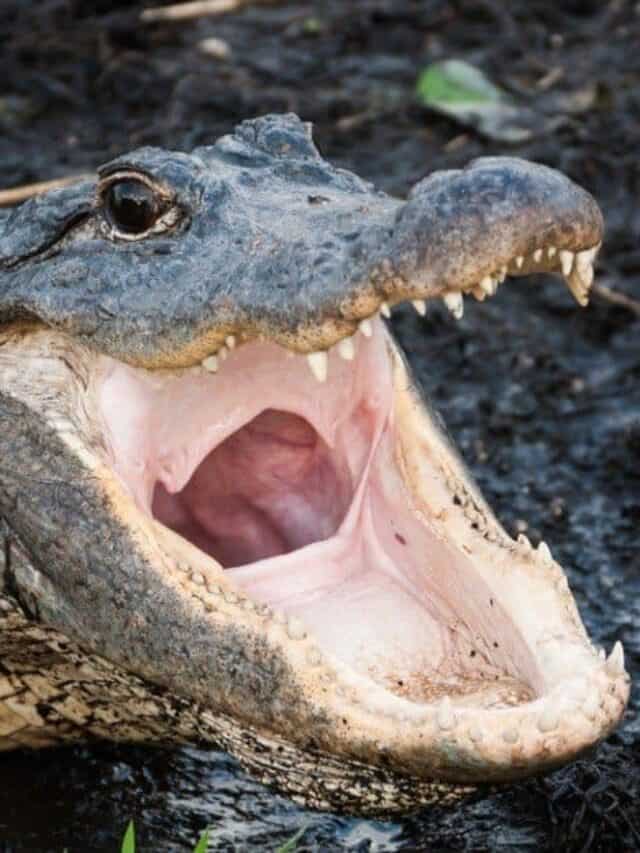
Alligators have huge jaws and are known for chomping up their prey!
©iStock.com/unclegene
But after a little analysis, it will eventually come to our minds that what we had just witnessed in the video is not a natural or common occurrence.
Yes, alligators preying on mammals, birds, lizards, or other less cunning animals might be normal, but seeing them lunging on venomous snakes is another thing. Snakes have venoms to utilize for hunting, but more importantly, to aid them in self-defense.
So what the video portrayed just showed how alligators can overpower venomous snakes such as water moccasins. But how is that possible if these snakes have venom?
Only a few animals can withstand snake venom and eat them. These animals include several birds of prey, bobcats, the Scottish Terrier, hedgehogs, honey badgers, and other snake species. But what about alligators?
Can Alligators Withstand Snake Venom?
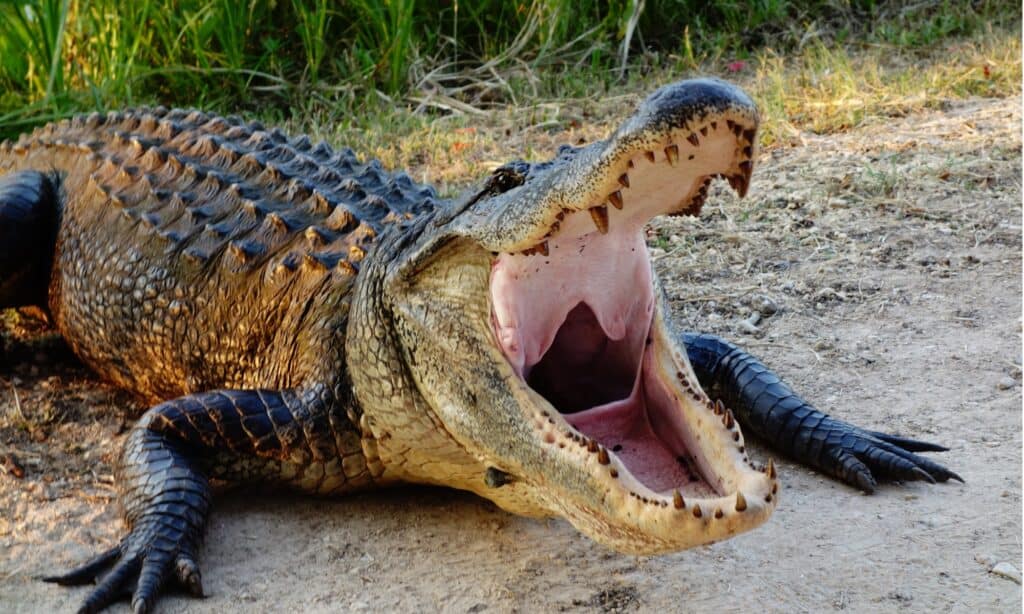
Alligators may be able to withstand venomous snake bites thanks to the qualities of alligator blood.
©iStock.com/Alex Pankratov
According to recent studies, alligators may be able to withstand venomous snake bites thanks to the qualities of alligator blood. John Finger, a biologist at Auburn University in Alabama, questioned how the reptiles lived through and survived after learning that they occasionally consume venomous snakes.
He and his co-authors decided to compare two substances found in the venom of pit vipers like cottonmouths, rattlesnakes, and copperheads to the characteristics of gator serum. This blood component contained proteins and antibodies. The components in the snakes’ venom were snake venom metalloproteinases (SVMP) and hemolytic toxins.
The response was compared by Finger and his co-authors to that of mouse serum subjected to the same substances. SVMPs typically cause tissue damage and blood cell death.
However, Finger said that the gator serum restrained this destructive reaction in the instance of the alligator. Hence, mouse serum was significantly more negatively affected by SVMP than gator serum.
Finger stated that the SVMP alone accounts for around 20% of the venom in these snakes, even though the researchers could not discover any comparable inhibitors against the hemolytic toxins. In other words, alligators may be able to withstand this component well enough to protect them from snake bites.
How Venomous are Cottonmouths?
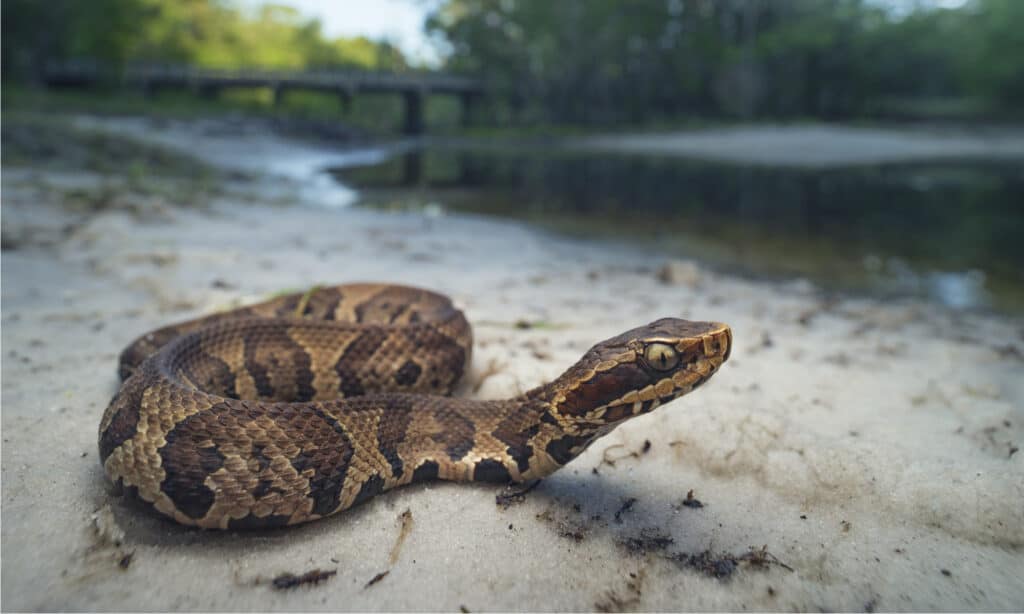
Bites of cottonmouths can result in death.
©Kristian Bell/Shutterstock.com
Cottonmouths are regarded as one of the most venomous and dangerous snakes in the world, which means eating and fighting them would require immense courage and immunity to the snake’s effects.
Cottonmouths can significantly incapacitate both humans and animals with their venom. Their bites can sometimes even result in death. Due to their venom and the results of their bites, water moccasins have developed a reputation for incredible danger.
However, cottonmouths aren’t aggressive and hardly ever start an attack. They usually only bite when people pick them up or stomp on them. Their long fangs are mostly used for catching prey, but they may also be used to threaten humans or prospective predators by biting them.
Venom from water moccasin bites is extremely strong and can be lethal to both people and animals. Internal bleeding, muscle injury, and excruciating pain at the bite site can all be symptoms of these bites.
Cottonmouth bites can result in swelling, cell death, and degradation since its venom typically damages tissues. Additionally, it has anticoagulant properties that prevent blood clots.
Cottonmouth bites can cause serious complications or even death if blood pressure is excessively high.
Where Do Alligators Live?
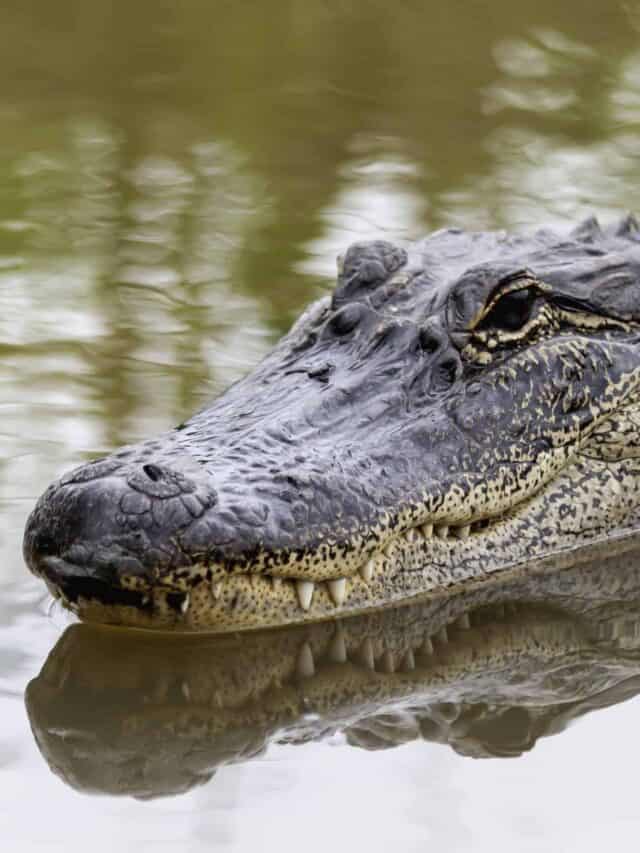
American Alligators live in fresh slow-moving water.
©iStock.com/Cindy Larson
Alligators are found in freshwater and otherwise slow-moving rivers. They are found in swamps, marshlands, and even lakes. They can, however, tolerate salt water for small amounts of time. This is because alligators don’t have salt glands.
The American alligator is found in South Florida and a few other places in the U.S., Whereas the American crocodile lives in several places such as Mexico, Central and South America, the Caribbean, and also South Florida.
How Long Do They Live?
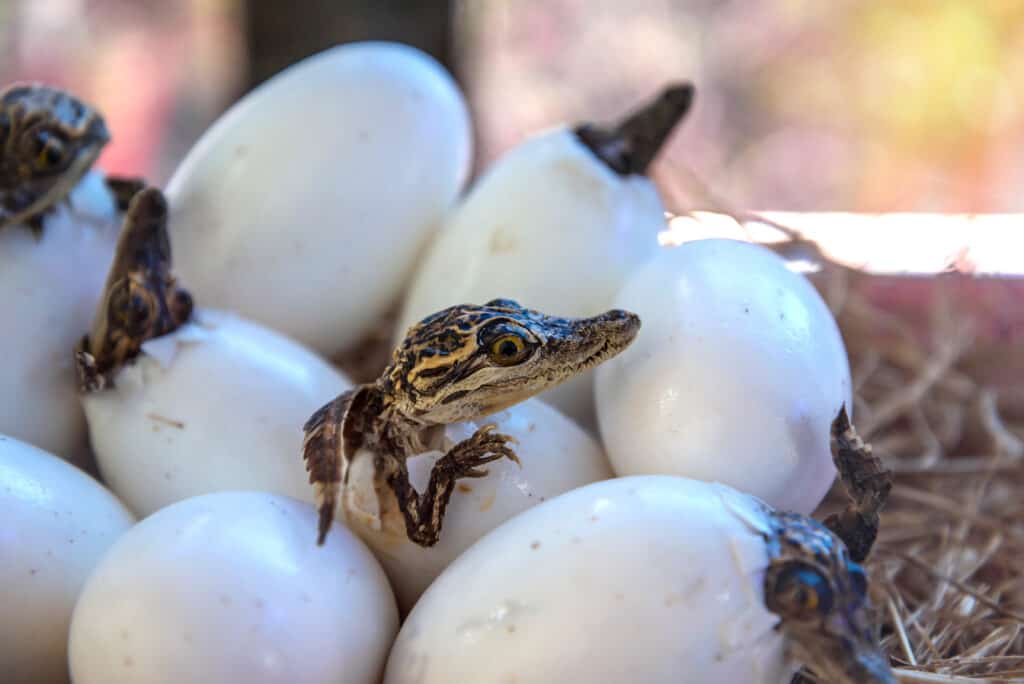
Alligators are tough cookies from the moment they are born.
©iStock.com/Casanowe
Alligators can live for up to 50 years in the wild and even longer in captivity. In the wild, they are threatened by habitat destruction, poaching, disease, and other human interference. Alligators are also susceptible to pollution from runoff or chemicals that make their way into their habitats, leading to health problems that can reduce their lifespan.
Who Lives With Alligators?
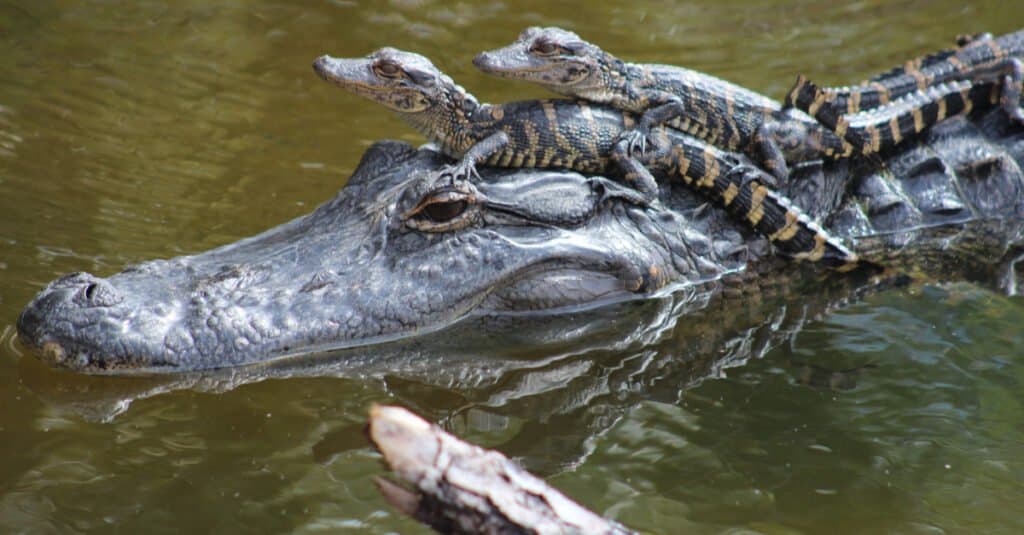
Alligators live in swamps, marshes, rivers, and lakes throughout the southeastern United States.
©Marc Pletcher/Shutterstock.com
Alligators are found in swamps, marshes, rivers, and lakes throughout the southeastern United States. They can often be seen lurking near the water’s edge or basking on logs in the sun. So what other animals share their aquatic habitat? The American alligator is known to coexist with a wide variety of other species. These include fish such as bass and catfish, turtles like snapping turtles and softshells, amphibians including frogs and salamanders, reptiles like snakes, and even birds like herons and egrets that wade through shallow waters looking for food. Alligators will also sometimes prey upon mammals such as raccoons or small deer that wander too close to their home territory by mistake. It’s important to remember that alligators should always be respected from a distance due to their powerful jaws!
The photo featured at the top of this post is © Thierry Eidenweil/Shutterstock.com
Thank you for reading! Have some feedback for us? Contact the AZ Animals editorial team.






